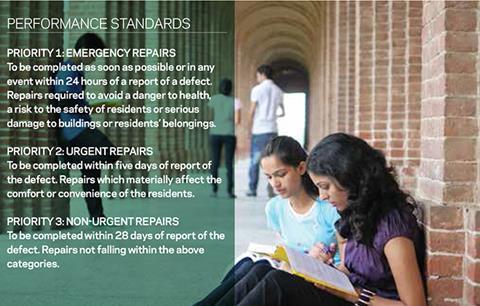Contractors and developers are used to paying LADs when a project is running late. But missing a deadline on student accommodation can lead to more complex issues

Academic institutions don’t only require their students to deliver work on time. Developers also face stringent deadlines to deliver student accommodation schemes.
Meeting the demand to complete accommodation for the new intake of students at the start of the academic year is critical and the implications of late delivery erode a developer’s and contractor’s profit.
There are a series of dates in the development timeline that must be met, the most important being 1 September - in preparation for the start of the academic year. In addition, a university will typically require some degree of certainty in the month of May of the number of beds available to let to its students, to enable them to start the marketing process. The end of July is important as the university would expect practical completion to occur to allow time for snagging works before students arrive.
Many factors may impact that programme including adverse weather, insolvency of subcontractors or unforeseen site constraints. So what happens if the programme slips?
In this event (subject to any extensions of time and satisfying any pre-conditions under the building contract), a pre-determined level of liquidated and ascertained damages (LADs) becomes due to the employer at a fixed rate for each day or week until the contractor completes the works. The amount of LADs should represent a genuine pre-estimate of the likely losses an employer will suffer in the event the works are not completed by the completion date. If the sum has no relation to the loss that could conceivably be incurred by the employer, the courts could decide the LADs clause is a penalty and unenforceable. It is therefore vital that an employer is able to demonstrate how the LADs figure was calculated.
So, what will be a genuine pre-estimate of losses where the critical date is not met? These may extend far beyond the costs of delay in the construction of an office building and are likely to include: providing suitable alternative accommodation for each student; relocating students to the completed accommodation after practical completion; and potential loss of business due to cancelled tenancy arrangements and rooms remaining empty.
The key difference in relation to losses suffered in the delay to completing student accommodation is that losses may extend beyond the date of practical completion. If student accommodation cannot be marketed and let before the start of the academic year, or tenancy agreements are cancelled, the rooms may remain unoccupied for the entire academic year with loss of income extending well beyond the completion date. Student accommodation LADs are therefore more complex and potentially more substantial than those expected on a usual project. All parties will need to carefully consider the impact of that potential liability when assessing the financial viability of a proposed development.

The developer’s timetable does not end upon practical completion. There is usually a defects liability period of 12 months, during which the developer will remain responsible for correcting defects that arise. Academic institutions providing student accommodation will be committed to complying with the ANUK/Unipol National Code of Standards which sets out minimum performance standards for maintenance activities and repairs (see table above).
Those performance standards will invariably be passed down to the developer during the defects liability period and in turn down to the building contractor, who will be expected to respond and rectify defects within the stipulated time frames (as opposed to the usual JCT position of “within a reasonable time”). This has a further impact on all parties involved and the contractual arrangements between the various participants will need to be carefully drafted to provide an effective reporting and response mechanism that can manage the response times required.
Developers of student accommodation need to ensure that the programme allows sufficient time to deal with unforeseen development issues. All participants need to engage in the process to ensure that the critical delivery date is met. Legal advisers need to make sure all potential impediments are taken into account as early as possible and, in the unfortunate event that the developer hands their work in late, the remedies available to the various participants are clearly defined and appropriate.
Paul Leamy is senior counsel in the real estate development team and Laura Smith is associate in the construction team at law firm Taylor Wessing


























No comments yet